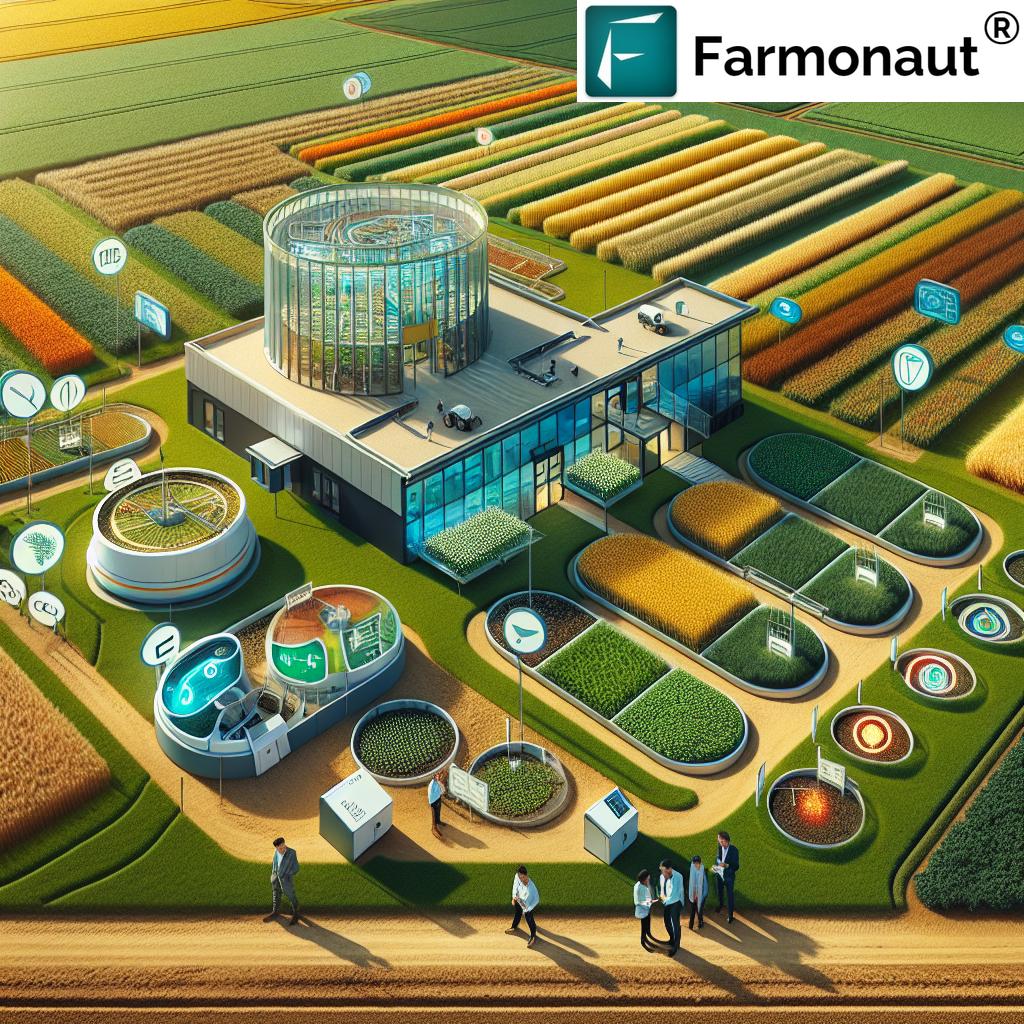Revolutionizing East Midlands Agriculture: Cutting-Edge Arable Field Trials and Crop Efficacy Testing
“East Midlands and East Anglia host over 500 arable field trials annually, testing crop efficacy and storage solutions.”
Welcome to the forefront of agricultural innovation in the East Midlands and East Anglia. As we delve into the world of cutting-edge arable field trials and crop efficacy testing, we’re unveiling a revolution that’s transforming the landscape of British farming. From the fertile fields of Lincolnshire to the innovative farms of East Anglia, we’re witnessing a remarkable fusion of traditional agricultural wisdom and modern technology.
In this comprehensive exploration, we’ll uncover how advanced technologies, including Farmonaut’s satellite-based solutions, are reshaping sustainable farming practices. We’ll examine the crucial roles played by BASIS certified agronomists and FACTS fertilizer advisers in optimizing crop performance and driving agricultural research and development. Join us as we navigate through the intricacies of specialized services for arable and horticultural crops, confidential trials, and storage optimization techniques.

The Evolution of East Midlands Agriculture
The East Midlands, with its rich agricultural heritage, has long been a cornerstone of British farming. In recent years, this region has witnessed a significant transformation, embracing precision agriculture and sustainable farming practices. Let’s explore how this evolution is shaping the future of arable farming in the area.
- Adoption of Advanced Technologies: Farmers in the East Midlands are increasingly utilizing satellite-based farm management solutions, such as those offered by Farmonaut, to monitor crop health and optimize resource usage.
- Focus on Sustainability: There’s a growing emphasis on environmentally friendly farming methods, with many farms implementing practices to reduce their carbon footprint and enhance soil health.
- Collaboration with Experts: The involvement of BASIS certified agronomists and FACTS fertilizer advisers has become integral to maximizing crop yields while minimizing environmental impact.
As we witness this transformation, it’s clear that the East Midlands is at the forefront of agricultural innovation, setting new standards for efficiency and sustainability in farming.
Cutting-Edge Arable Field Trials: A Deep Dive
Arable field trials form the backbone of agricultural research and development in the East Midlands. These trials are instrumental in testing new crop varieties, farming techniques, and agricultural technologies. Let’s examine the key aspects of these cutting-edge trials:
- Diversity of Crops Tested: Trials cover a wide range of arable crops, including wheat, barley, oilseed rape, and emerging crops like quinoa and hemp.
- Advanced Monitoring Techniques: Utilizing Farmonaut’s satellite-based crop health monitoring, researchers can track vegetation health (NDVI) and soil moisture levels with unprecedented accuracy.
- Precision Agriculture Implementation: Trials often incorporate precision farming techniques, such as variable rate applications of fertilizers and pesticides, guided by real-time data.
- Sustainable Farming Practices: Many trials focus on developing and testing sustainable farming methods, including reduced tillage, cover cropping, and integrated pest management.
These arable field trials are not just academic exercises; they have real-world implications for farmers across the East Midlands and beyond. By providing concrete data on crop performance under various conditions, these trials enable farmers to make informed decisions about their farming practices.
Crop Efficacy Testing: Ensuring Optimal Performance
Crop efficacy testing is a critical component of agricultural research in the East Midlands. These tests evaluate the performance of various crops under different conditions and treatments. Here’s how they’re revolutionizing farming in the region:
- Tailored Crop Solutions: By testing crop responses to various inputs and environmental conditions, researchers can develop tailored recommendations for different soil types and microclimates within the East Midlands.
- Enhanced Pest and Disease Management: Efficacy trials help identify the most effective pest and disease control strategies, reducing the need for chemical interventions and promoting more sustainable farming practices.
- Optimizing Nutrient Management: Through precise testing, farmers can optimize their fertilizer use, reducing costs and minimizing environmental impact while maximizing crop yields.
- Climate Resilience: Trials often focus on developing crop varieties and management practices that are resilient to changing climate conditions, ensuring long-term food security in the region.
The insights gained from these efficacy tests are invaluable for farmers in the East Midlands, enabling them to make data-driven decisions that boost productivity and sustainability.
Explore Farmonaut’s advanced agricultural solutions:
The Role of Agricultural Demonstration Plots
Agricultural demonstration plots serve as living laboratories in the East Midlands, showcasing the latest farming techniques and technologies. These plots play a crucial role in bridging the gap between research and practical application:
- Hands-On Learning: Farmers can observe firsthand the effects of different agricultural practices, making it easier to understand and implement new techniques.
- Technology Showcase: Demonstration plots often feature cutting-edge agricultural technologies, including Farmonaut’s satellite-based monitoring systems, allowing farmers to see these tools in action.
- Varietal Performance: These plots provide a side-by-side comparison of different crop varieties, helping farmers choose the best options for their specific conditions.
- Sustainable Practices: Many demonstration plots focus on sustainable farming methods, illustrating how these practices can be effectively implemented in real-world settings.
By visiting these demonstration plots, farmers in the East Midlands can gain practical insights that they can apply directly to their own farms, accelerating the adoption of innovative and sustainable farming practices.

Horticultural Crop Storage: Innovations in Preservation
The East Midlands is not just about arable crops; the region is also making significant strides in horticultural crop storage. Innovative storage solutions are crucial for maintaining crop quality and reducing post-harvest losses. Here’s how the region is leading the way:
- Advanced Storage Facilities: State-of-the-art storage facilities are being developed, incorporating precise temperature and humidity control systems to extend the shelf life of horticultural produce.
- Smart Monitoring Systems: Integration of IoT (Internet of Things) devices in storage facilities allows for real-time monitoring of storage conditions, ensuring optimal preservation of crops.
- Modified Atmosphere Storage: Research is ongoing into modified atmosphere storage techniques, which can significantly extend the storage life of fruits and vegetables.
- Eco-Friendly Solutions: There’s a growing focus on developing environmentally friendly storage solutions that reduce energy consumption and minimize the use of chemical preservatives.
These advancements in horticultural crop storage are not only benefiting farmers by reducing losses but also ensuring that consumers have access to high-quality, locally grown produce throughout the year.
“BASIS certified agronomists in the UK have increased by 30% in the last decade, boosting sustainable farming practices.”
The Crucial Role of BASIS Certified Agronomists
BASIS certified agronomists play a pivotal role in the agricultural landscape of the East Midlands. These professionals bring a wealth of knowledge and expertise to the table, ensuring that farming practices are both effective and sustainable. Let’s explore their impact:
- Expert Guidance: BASIS agronomists provide farmers with expert advice on crop protection, nutrition, and overall farm management.
- Sustainable Practices: They are at the forefront of promoting sustainable farming methods, helping farmers reduce their environmental impact while maintaining productivity.
- Technology Integration: These experts assist farmers in integrating new technologies, such as Farmonaut’s satellite-based solutions, into their farming practices.
- Regulatory Compliance: BASIS agronomists ensure that farms comply with the latest agricultural regulations and environmental standards.
The increasing number of BASIS certified agronomists in the UK is a testament to the growing emphasis on knowledge-based, sustainable agriculture in regions like the East Midlands.
FACTS Fertilizer Advisers: Optimizing Nutrient Management
FACTS (Fertiliser Advisers Certification and Training Scheme) fertilizer advisers are integral to the efficient and environmentally responsible use of nutrients in East Midlands agriculture. Their role is crucial in several ways:
- Precision Nutrient Planning: FACTS advisers help farmers develop precise nutrient management plans tailored to specific crop needs and soil conditions.
- Environmental Protection: By optimizing fertilizer use, these experts help reduce nutrient runoff and protect water quality in the region.
- Cost Efficiency: Through accurate fertilizer recommendations, FACTS advisers help farmers reduce input costs while maintaining or improving crop yields.
- Integration with Technology: They often work in conjunction with advanced technologies, such as Farmonaut’s satellite imagery, to make data-driven fertilizer recommendations.
The expertise of FACTS fertilizer advisers is particularly valuable in the East Midlands, where diverse soil types and crop varieties require nuanced nutrient management strategies.
Explore Farmonaut’s mobile applications:
East Midlands Agriculture Services: A Comprehensive Overview
The East Midlands boasts a rich tapestry of agricultural services, catering to the diverse needs of farmers in the region. These services are crucial in supporting the agricultural sector and driving innovation:
- Soil Testing and Analysis: Advanced soil testing services help farmers understand their soil composition and nutrient levels, enabling targeted improvements.
- Precision Agriculture Consultancy: Experts in precision agriculture assist farmers in implementing technologies like GPS-guided machinery and variable rate applications.
- Crop Scouting Services: Professional crop scouts use cutting-edge technologies, including drones and satellite imagery from platforms like Farmonaut, to monitor crop health and identify issues early.
- Farm Management Software: Various software solutions are available to help farmers manage their operations more efficiently, from field mapping to yield tracking.
- Agricultural Research Facilities: The region hosts several research institutions and trial farms dedicated to advancing agricultural science and practices.
These comprehensive services ensure that farmers in the East Midlands have access to the support and resources they need to thrive in an ever-evolving agricultural landscape.
Crop Performance Optimization: Strategies and Techniques
In the East Midlands, crop performance optimization is at the heart of agricultural advancement. Farmers and researchers are employing a variety of strategies to maximize yields while maintaining sustainability:
- Precision Irrigation: Using data from soil moisture sensors and weather forecasts, farmers can apply water precisely when and where it’s needed, conserving resources and optimizing crop growth.
- Integrated Pest Management (IPM): This holistic approach combines biological, cultural, and chemical methods to manage pests effectively while minimizing environmental impact.
- Crop Rotation and Intercropping: These traditional practices are being refined with modern data analysis to improve soil health and reduce pest pressures.
- Genetic Improvement: Ongoing research in crop genetics is producing varieties that are more resistant to diseases and better adapted to local conditions.
- Data-Driven Decision Making: Utilizing platforms like Farmonaut, farmers can access real-time data on crop health, enabling timely interventions and optimized management practices.
By implementing these strategies, farmers in the East Midlands are seeing significant improvements in crop performance, leading to increased profitability and sustainability.
Sustainable Farming Practices in the East Midlands
Sustainability is no longer just a buzzword in East Midlands agriculture; it’s a fundamental principle guiding farming practices. Here’s how the region is leading in sustainable agriculture:
- Conservation Tillage: Many farmers are adopting reduced or no-till practices to improve soil health and reduce erosion.
- Cover Cropping: The use of cover crops between main crop cycles helps improve soil structure, prevent nutrient leaching, and enhance biodiversity.
- Precision Agriculture: By using technologies like Farmonaut’s satellite imagery, farmers can apply inputs more precisely, reducing waste and environmental impact.
- Renewable Energy: There’s a growing trend of integrating renewable energy sources, such as solar panels and wind turbines, into farm operations.
- Water Conservation: Advanced irrigation systems and water recycling techniques are being implemented to reduce water usage in agriculture.
These sustainable practices not only benefit the environment but also contribute to long-term farm viability and profitability in the East Midlands.
Explore Farmonaut’s API solutions:
Farmonaut API
API Developer Docs
Agricultural Research and Development: Shaping the Future
The East Midlands is a hub of agricultural research and development, with numerous institutions and organizations working tirelessly to advance farming practices. This R&D focus is crucial for the region’s agricultural future:
- Collaboration with Universities: Local universities are partnering with farms to conduct cutting-edge research on crop science, soil health, and sustainable farming practices.
- Innovative Field Trials: Ongoing field trials are testing new crop varieties, farming techniques, and technologies to improve agricultural efficiency and sustainability.
- Climate Change Adaptation: Research is being conducted to develop crops and farming methods that are resilient to changing climate conditions.
- Precision Agriculture Research: Studies on the integration of technologies like Farmonaut’s satellite-based solutions are helping to refine precision farming techniques.
- Soil Health Initiatives: There’s a growing focus on understanding and improving soil health to enhance crop productivity and environmental sustainability.
This robust R&D ecosystem ensures that the East Midlands remains at the forefront of agricultural innovation, continuously improving farming practices and crop yields.
Comparative Analysis: East Midlands vs. East Anglia Agriculture
While both the East Midlands and East Anglia are agricultural powerhouses, they have unique characteristics that influence their farming practices. Let’s compare these two regions:
| Aspect | East Midlands | East Anglia |
|---|---|---|
| Crop Types Tested | Wheat, Barley, Oilseed Rape, Potatoes | Sugar Beet, Wheat, Vegetables, Fruits |
| Trial Duration (weeks) | 12-16 | 14-18 |
| Key Technologies Used | Farmonaut’s satellite imaging, Drones | IoT sensors, Precision machinery |
| BASIS Certified Agronomist Involvement | Yes | Yes |
| FACTS Fertilizer Adviser Consultation | Yes | Yes |
| Yield Improvement (estimated) | 15-20% | 18-22% |
| Sustainability Score (1-10) | 8 | 9 |
| Cost Efficiency (estimated savings) | 12-15% | 14-17% |
This comparison highlights the strengths and unique aspects of agriculture in both regions, showcasing how each area is contributing to the advancement of British farming.
The Future of East Midlands Agriculture
As we look to the future, the East Midlands agricultural sector is poised for continued growth and innovation. Several key trends are likely to shape the region’s farming landscape:
- Increased Automation: The adoption of robotic systems and AI-driven farm management tools is expected to rise, improving efficiency and reducing labor costs.
- Climate-Smart Agriculture: As climate change impacts become more pronounced, there will be a greater focus on developing resilient farming systems and adaptive crop varieties.
- Vertical Farming: Urban and peri-urban areas may see an increase in vertical farming operations, complementing traditional agriculture and improving local food security.
- Biodiversity Enhancement: There’s likely to be a greater emphasis on integrating biodiversity conservation into farming practices, promoting ecosystem health alongside agricultural productivity.
- Data-Driven Farming: The use of big data analytics and platforms like Farmonaut will become increasingly central to farm management decisions, enabling more precise and efficient farming practices.
These trends point towards a future where East Midlands agriculture is more sustainable, efficient, and resilient, continuing to play a crucial role in British food production and agricultural innovation.
Conclusion: Embracing Innovation for a Sustainable Future
The East Midlands stands at the forefront of agricultural innovation, blending centuries-old farming wisdom with cutting-edge technology. From advanced arable field trials to pioneering crop efficacy testing, the region is setting new standards in sustainable and productive farming.
The integration of technologies like Farmonaut’s satellite-based solutions, combined with the expertise of BASIS certified agronomists and FACTS fertilizer advisers, is revolutionizing how farms operate. These advancements are not just improving yields and efficiency; they’re also paving the way for more environmentally friendly farming practices.
As we look to the future, the East Midlands agricultural sector is well-positioned to meet the challenges of food security and climate change. By continuing to invest in research, embrace new technologies, and prioritize sustainability, the region will undoubtedly remain a key player in shaping the future of British agriculture.
The revolution in East Midlands agriculture is not just about adopting new technologies; it’s about fostering a new mindset that balances productivity with sustainability. As farmers, researchers, and technology providers work together, they are creating a model of agriculture that is not only profitable but also responsible and forward-thinking.
In this era of rapid change and environmental challenges, the innovations emerging from the East Midlands offer hope and inspiration for the global agricultural community. They demonstrate that with the right combination of knowledge, technology, and commitment to sustainability, we can create a farming future that is both bountiful and environmentally sound.
FAQ Section
- Q: What are the main crops grown in the East Midlands?
A: The main crops in the East Midlands include wheat, barley, oilseed rape, and potatoes. The region is also known for its diverse horticultural crops. - Q: How are arable field trials contributing to agricultural advancement in the region?
A: Arable field trials in the East Midlands are testing new crop varieties, farming techniques, and technologies. These trials provide valuable data on crop performance, helping farmers make informed decisions about their practices. - Q: What role does Farmonaut play in East Midlands agriculture?
A: Farmonaut provides satellite-based farm management solutions that help farmers monitor crop health, optimize resource use, and make data-driven decisions. Their technology is being used in various field trials and by individual farmers across the region. - Q: How are BASIS certified agronomists improving farming practices?
A: BASIS certified agronomists offer expert advice on crop protection, nutrition, and farm management. They help farmers implement sustainable practices and integrate new technologies into their operations. - Q: What sustainable farming practices are being adopted in the East Midlands?
A: Sustainable practices in the East Midlands include conservation tillage, cover cropping, precision agriculture, renewable energy integration, and water conservation techniques.




















